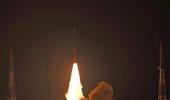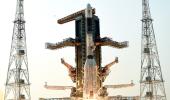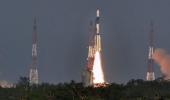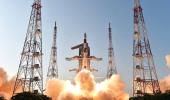Mission Shakti 'shows the development within India's military space programme, its desire to be seen as a global space power and its recognition of the potential dangers of China's counterspace programme.'
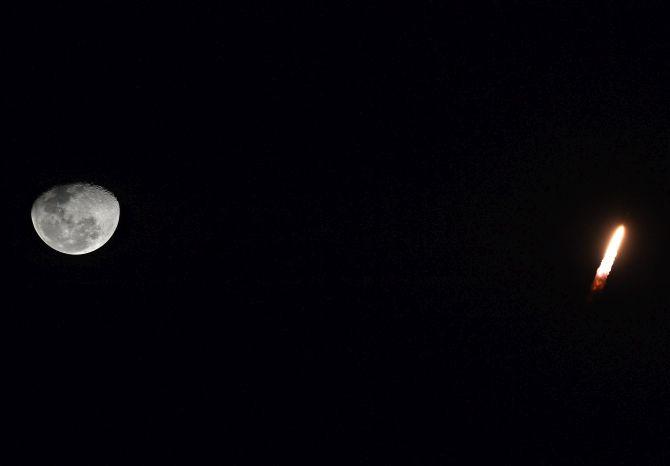
Just five days before India conducted Mission Shakti on March 27, 2019, Alexandra Stickings -- research fellow for space policy and security at Britain's Royal United Services Institute, RUSI -- noted, 'From the Cold War and onwards, we've seen the US, Russia and China exploring anti-satellite missiles... The problem is that it's very difficult to define what a weapon in space is.'
"It is likely that this test was primarily to demonstrate the capability and indicate deterrence. However, the timing of the test, not long before elections, is interesting," Stickings, whose research interests include military space, space warfare, counterspace capabilities and international space programmes, tells Archana Masih/Rediff.com in an e-mail interview.
How would the US, Russia and China view India's anti missile test?
It is unlikely that any of these countries would welcome this news. Although they all have this capability there would likely be uneasiness about another country joining the club.
Russia and China have been trying to push a new treaty through PAROS (Preventing an Arms Race in Outer Space), which has so far been blocked by the US.
The test will also have generated space debris (although because of the height of the orbit this is not as much as it could have been) which is a danger to other satellites and will need resources to monitor it.
What is the significance of India's anti missile test?
The test makes India the fourth country to possess such ASAT capability.
It is significant as it shows the development within India's military space programme, its desire to be seen as a global space power and its recognition of the potential dangers of China's counterspace programme.
How impressive an achievement is it? As an expert on space security, what were your thoughts when you heard the news?
It is certainly an impressive achievement, but it was not a complete secret that India was pursuing this capability, so there was not a huge amount of surprise.
What does such a test demonstrate? Capability and deterrence to safeguard India's space assets?
It is likely that this test was primarily to demonstrate the capability and indicate deterrence.
India is well aware of China's developments and ambitions in space and wants to ensure that its own space assets are protected.
However, the timing of the test, not long before elections, is interesting.
How can this technology be used in a positive way?
This technology could potentially be used to destroy a large, malfunctioning space asset that was deemed a danger, although there would be a generation of debris that would pose additional problems.
Has there been an acceleration of India's space programme in the last 5 years? What do you see as the reason for it?
India has accelerated its space programme in the last 5 years, particularly in terms of commercial launch of small satellites.
There are huge economic benefits from space which India will be aware of.
India's ministry of external affairs has said that India's space programme does not threaten any country -- do you think other nations will view India's tests in such a benign manner?
Because of regional politics, it is unlikely China will see this as benign. It will also likely worry Pakistan.
What is your assessment of international cooperation between countries regarding space traffic management?
Space traffic management has historically been done by the military, which has limited international cooperation, but there is a move towards commercial STM which will likely increase collaboration amongst the US and its allies.
What kind of debris will India's test generate? And how will this debris be removed?
This test was in a fairly low orbit so evidence suggests the majority of the debris will enter the atmosphere in a short space of time, although some will have entered higher orbits.
At present, debris removal technologies are still in the testing phase.
Because of the vastness of the universe, is the problem of debris an understated issue in space exploration? Are we going to clutter space? In your estimation how much debris is there in space and what threat does it pose?
Debris is mostly a problem in low earth orbit. This is not to say that we should not be responsible space explorers.
There is now a recognition of the problem of debris and a move towards reusable assets that will hopefully lead to agreed responsible norms of behaviour.
In your report Is Space the New Cyber, you noted that 'When evolving space capabilities emerge, the space environment will become more complex. This may change the dynamics of the threats and hazards and responses required space assets.'
Could you please explain how the space environment will become more complex, how the threats and hazards will change and what form the responses will take to protect space assets?
Satellites are being developed that have manoeuvring capabilities, companies are looking at on-orbit servicing, debris removal and asteroid mining, and countries are looking at new counterspace capabilities.
Operators need to be aware of all the potential dangers.
